Matthew Rimmer's Blog
July 15, 2025
Torres Strait Islander climate change decision by Fed Court at odds with UN
16 July 2025

QUT legal expert Professor Mathew Rimmer is available to speak on the yesterday’s decision:
· Judge doubted negligence law appropriate vehicle to deal with climate change matters
· Judge said action on climate change a political matter for Fed Govt
· The judge maintained Torres Strait Islanders’ only recourse was via ‘the ballot box’.”
· An appeal court could further explore comparative international developments in climate litigation.
In the landmark case of Pabai Pabai v Commonwealth, Justice Michael Wigney of the Federal Court of Australia doubted whether the law of negligence was the appropriate vehicle to deal with matters of climate change.
QUT legal expert Professor of Intellectual Property and Innovation Matthew Rimmer said that judge held that the Commonwealth did not owe a duty of care to Torres Strait Islanders to protect them from climate change.
“Judge Wigney acknowledged that the Commonwealth’s response to the threat of climate change to the Torres Strait Islands and their traditional inhabitants has been wanting,” Professor Rimmer said.
“However, Judge Wigney stressed that the question of action on the reduction of greenhouse gases was ultimately a political matter for the Federal Government.
“The judge warned there could be little, if any, doubt that the Torres Strait Islands face a bleak future if urgent action is not taken. The judge maintained that the only recourse that Torres Strait Islanders have is via ‘the ballot box’.”
Professor Rimmer said that the case recognised that the Torres Strait Islands had been ravaged by the impacts of climate change.
“The judge also noted that climate change is having ‘a devastating impact on the traditional way of life of Torres Strait Islanders and their ability to practices Ailan Kastom, their unique and distinctive body of customs, traditions, observances and beliefs.’
“The judge doubted, though, the applicants could obtain relief — ‘in respect of their loss of fulfilment of Ailan Kastom’.
Professor Rimmer said the protection of traditional knowledge, cultural heritage, and Indigenous intellectual property warranted greater consideration.
“The judge showed a significant amount of judicial humility, maintaining that a single judge of the Federal Court of Australia could not change the law.
“The judge did observe that the law could change through ‘the incremental development or expansion of the common law by appellate courts, or by the enactment of legislation.’
“The judge said the plaintiffs could take this case further to the Full Court of the Federal Court of Australia, and ultimately, the High Court of Australia (which has previously engaged in judicial innovation in the Mabo case).’
Professor Rimmer said an appeal could explore the consistency of the decision with comparative law and international law.
“An appeal court could further explore comparative developments in climate litigation.”
Professor Rimmer said yesterday’s decision was also at odds with the successful 2019 Urgenda decision in the Netherlands in which the Dutch Supreme Court held that the Dutch government had an obligation to urgently reduce greenhouse emission in line with its human rights obligations.
The decision of the Federal Court of Australia in Pabai Pabai v Commonwealth could be contrasted with the decision of 2022 Torres Strait Eight case of Daniel Billy and others v Australia.
Professor Rimmer said that in the Torres Strait Eight case the UN Human Rights Committee found that Australia’s failure to adequately protect Torres Strait Islander people from adverse climate impacts violated their human rights.
“The Committee found that under the UN’s Covenant on Civil and Political Rights, which Australia ratified in 1980, Australia had violated their human rights, in particular their cultural rights, and rights to be free from arbitrary interferences with their private life, and family, and home,” Professor Rimmer said.
Pabai v Commonwealth of Australia (No 2) [2025] FCA 796 Decision — https://www.judgments.fedcourt.gov.au/judgments/Judgments/fca/single/2025/2025fca0796 Summary — https://www.judgments.fedcourt.gov.au/judgments/Judgments/fca/single/2025/2025fca0796/summaries/2025fca0796-summary
For reactions of defendants, see The Hon Chris Bowen MP, Minister for Climate Change and Energy, and the Hon Malarndirri McCarthy, Minister for Indigenous Australians, Senator for the Northern Territory, ‘Joint statement on Pabai Pabai v Commonwealth’, Australian Government, 15 July 2025
https://minister.dcceew.gov.au/bowen/media-releases/joint-statement-pabai-pabai-v-commonwealth
For reactions of plaintiffs, see Joseph Gunzier, ‘‘My Heart is Broken’: Climate Case Dismissed Despite Findings of Cultural Loss’, National Indigenous Times, 16 July 2025, https://nit.com.au/15-07-2025/19140/my-heart-is-broken-climate-case-dismissed-despite-findings-of-cultural-loss
Niki Widdowson, ‘Torres Strait Islander climate change decision by Fed Court at odds with UN’, Media Alert, QUT,16 July 2025, https://drrimmer.medium.com/torres-strait-islander-climate-change-decision-by-fed-court-at-odds-with-un-4d1da4c805a2 See also Infojustice https://infojustice.org/archives/46594
[image error]November 10, 2024
SDGs + IP
CITMA Review
Bita Amani and Matthew Rimmer

The editors of a new book explain trade mark law’s unique role in meeting global sustainability goals
Trade marks are well acknowledged as a valuable form of intellectual and industrial property and as significant corporate assets. In the literature on IP and sustainable development, however, trade mark law and related rights are seldom given due credit for their relevance and importance. Often, the scholarship is dominated by work on copyright law and access to knowledge, patent law and access to essential medicines or innovation, creativity, and technology transfer. When trade mark law is occasionally mentioned, it has often been in the context of the Fair Trade labels and other high-profile labelling systems.
The authors of The Elgar Companion to Intellectual Property and the Sustainable Development Goals systematically mapped the matrix of connections between intellectual property rights (IPRs) and the UN Sustainable Development Goals (SDGs), with the help of a diverse cast of contributors from around the world. They also looked to redress the relative neglect of trade mark law and related rights amid diversified examinations of the relationship between IPRs and the SDGs — particularly as they pertain to the environment, public health, agriculture, human rights and the reduction of poverty and inequality.
“Trade mark law and related rights are seldom given due credit for their relevance and importance”
This article offers a selection of some of the key insights from the book and ways that the trade mark profession, in particular, can help advance sustainable global progress.
Right to repair
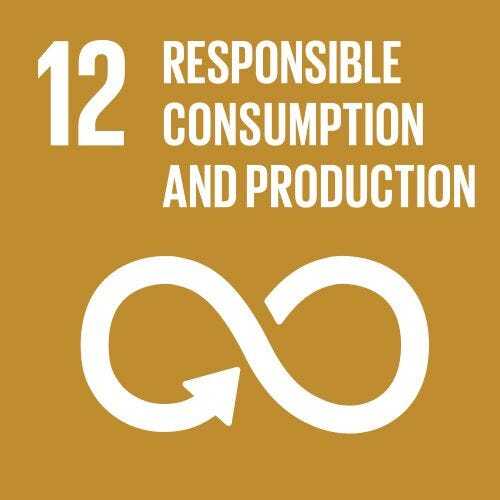
Trade mark law continues to attract public interest and considerations of user rights historically reserved for copyright law and policy. In the context of the right of repair, IT giant Apple brought a legal action for trade mark infringement against an independent repairer, Henrik Huseby, in Norway. Huseby had been using imported iPhone-compatible screens — which Apple deemed counterfeit — in phone repairs. Norway’s Supreme Court ruled in favour of Apple, and the action has become a cause célèbre.1 The dispute has highlighted the need for trade mark law to be included in discussions of law reform in respect of the right to repair. There should be contemplation of how trade mark law could better promote a circular economy — with responsible consumption and production.
In chapter 17, Taina Pihlajarinne, Professor of Law at the University of Helsinki, discusses IP and responsible production and consumption (SDG 12). She considers how trade marks and certification marks can have positive effects in conveying to consumers environmental sustainability and so may function to advance Target 12.8 of the SDGs by conveying information regarding the characteristics and qualities of goods that may empower sustainable consumption for eco-conscious consumers. This, in turn, may promote sustainable lifespans less directly.
Pihlajarinne also considers the negative impacts of IPRs for planned obsolescence and impediments to the right to repair. She considers trade mark exhaustion perspectives on the reutilisation of products and materials — for instance, where an original trade mark is fixed on a repaired or repurposed item. Noting the question of whether leaving the mark on the item is even legally allowed, she also raises the problem of removing such marks — the difficulty of which may actually be “a direct obstacle to repair or reutilisation”. There is also the possibility of a trade mark actually operating as a “badge of recycling” and an indication of origin of its raw materials, where a product is clearly made of recycled products now serving an alternative use. As Pihlajarinne argues: “IP-based barriers to repair and reutilisation… could be demolished by creating a ‘sustainable lifespan’ principle, indicating that exclusive rights are limited to the notion of a sustainable lifespan”. She continues: “The key idea of the potential principle would be that exclusivity covers only acts beyond those whose genuine purpose is to maximise the lifespan of the product or material.”
There have been burgeoning law reform efforts in respect of the right to repair, including, for example, the EU’s 2024 Right to Repair Directive. There have also been regulatory initiatives and law reform work on the right to repair in the US, Australia and Canada. These are all efforts to promote sustainable development and the circular economy, and trade mark rights should not form a barrier to this right.

Fixing Factories in the UK are community repair hubs that expand the lifespan of electronic appliances
The tobacco endgame
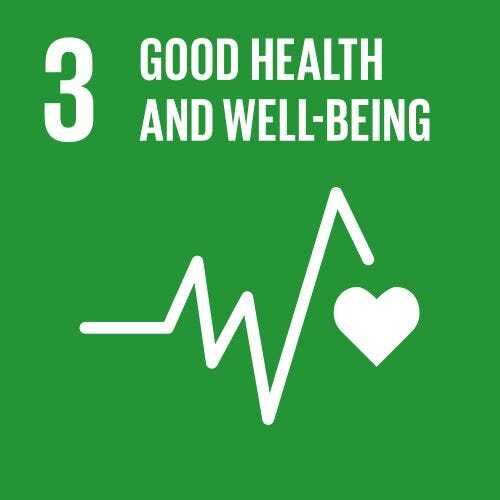
In chapter 3, Matthew Rimmer focuses on the tobacco endgame, exploring the intersection between IP, human rights and sustainable development (particularly SDG 3, dedicated to the promotion of health and wellbeing). Rimmer considers how trade mark law and policy became entangled in conflicts over tobacco control, with public health hanging in the balance of their resolution.
Former Norwegian Prime Minister Gro Harlem Brundtland played a transformative role in the articulation of sustainable development. She also played a key role during her leadership of the World Health Organization (WHO) from 1998 to 2003, helping establish the WHO Framework Convention on Tobacco Control 2003. She was particularly concerned about developing countries and least-developed countries being harmed by the global tobacco epidemic. Brundtland hoped that the framework convention would encourage nation states to introduce a comprehensive array of tobacco control measures.
A number of leading nation states introduced pioneering tobacco control measures, such as graphic health warnings and plain packaging of tobacco products. In response, Big Tobacco companies argued that tobacco control measures had adversely impacted their trade mark rights and other related IPRs. The tobacco industry asserted that public health initiatives violated IP law, trade law and investment law.
The High Court of Australia rejected the claims of the tobacco industry that plain packaging of tobacco products involved an acquisition of property. Similarly, other superior courts have given short shrift to the industry’s claims in legal conflicts based on tobacco control measures. Philip Morris International brought failed investor-state dispute settlement actions against Uruguay and Australia over the introduction of graphic health warnings and plain packaging of tobacco products. Australia successfully defended plain packaging of tobacco products against a number of complainants in the World Trade Organization.
Now, with continuing concerns around fresh threats from the tobacco industry, such as e-cigarettes and disposable vapes, a new generation of tobacco endgame policies is being developed by nation states (such as Australia, New Zealand and the UK) to combat the global tobacco epidemic. Making comparisons to the behaviour of fossil-fuel companies, concerns arise round Big Tobacco’s use of greenwashing tactics to disguise the continuing harms of its products, with the author calling for “zero tolerance” on this matter. No doubt there will be further legal conflict over tobacco control in domestic courts and international bodies.

Plain packaging laws have been enacted in over 20 countries

About the SDGs
In 2015, the UN adopted 17 Sustainable Development Goals (SDGs) “as a universal call to action to end poverty, protect the planet and ensure that by 2030 all people enjoy peace and prosperity”. All 191 UN Member States have committed to achieving the SDGs.
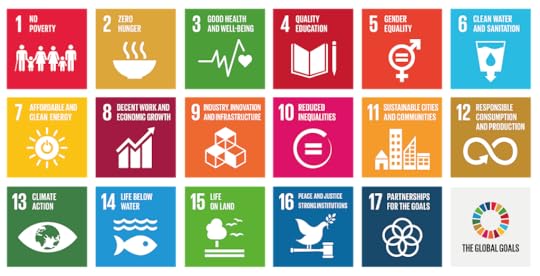
Trade mark law and inequality
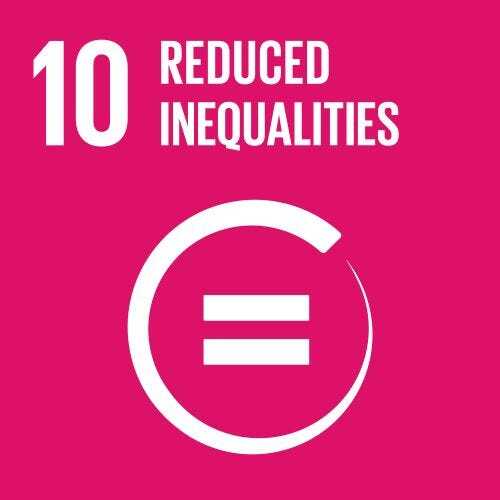
SDG 10 is focused on reducing inequality within and among nations. In chapter 15, Bita Amani maps equality as both an internationally recognised human right protected under various legal instruments and a constitutional right. In both cases it is to be understood as a right to substantive equality. She notes that IPRs “define the boundaries of inclusion, exclusion and belonging, with a long history tied to governing communities and nation-state building”. Moreover, she highlights how “IPRs’ and SDG 10’s promises are stymied by the politics of social contexts in which such rights exist, but also by a narrow understanding of what reducing inequality demands as a commitment”. In the context of trade marks, she highlights harmful, discriminatory uses of race branding that move beyond communicating trade source identity to racialised branding of identities with signs that undermine equal recognition of dignity and citizenship.
In the US context, following a successful constitutional challenge in 2017 with the Matal v Tam2 decision to strike down the prohibition on registering disparaging marks, market pressures rather than law generated a move away from well-established racialised marks. In Canada, the constitutionality of such trade mark provisions, which are far more restrictive in prohibiting both registration and use of such marks “as a trade mark or otherwise”, has yet to be tested. Yet an interim decision of a human rights tribunal demonstrates that such bodies can and should seize jurisdiction over trade mark-based discrimination, holding that trade marks are a negative right that must remain compliant with domestic anti-discrimination legislation.

Supporting cycling to help improve air quality and road safety is one of the SDGs’ aims
Geographical indications
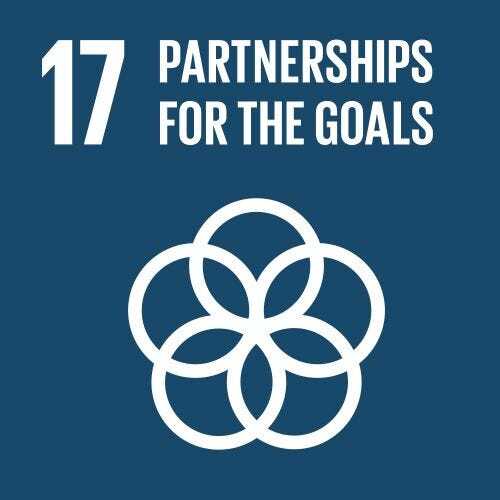
In chapter 22, Titalayo Adebola (Lecturer in Law at the University of Aberdeen) provides an insightful analysis of how geographical indications (GIs) may be leveraged through branding to advance the commercial success of a domestic product, taking the example of Ogogoro liquor. GIs are a form of recognised IP provided for by the TRIPS Agreement through which collective, if not cultural, interests have been advanced. Internationally, subject to some exceptions and limits, TRIPS provides higher protection for wines and spirits (Article 23). Historically, national protections were limited to wines and spirits, raising critiques that these served to advance Eurocentric cultural production while traditional cultural expressions of Indigenous communities were left behind. The scope of GI protection has expanded in some jurisdictions since the TRIPS Agreement.
Reflecting on the African Continental Free Trade Area, Adebola considers the African Union’s Agenda 2063 and the commitment to sustainable development. Adebola writes that: “GI[s] help to distinguish origin-linked products and generate revenue across production and marketing value chains.” Still, with only some 200 registered GIs for the continent, she argues that such instruments remain significantly underutilised by African nations.

Using the Ogogoro palm spirit product of Nigeria as a case study, she explains how potential GI protection may complement branding efforts to help ensure the commercial success of domestic products for trade and export. This is a product that is sold unpackaged and unbranded, in unlabelled and unsealed bottles, integrated into cultural practices and ceremonies and linked to resource-poor people, and may be attractive for GI protection in multiple African countries. GI protection may provide a basis for quality consistency and standardisation and may improve the commercial success of the good domestically in competition with imports, she suggests, as “GIs primarily stimulate demand for the class of products collectively”.
Overall, branding and exporting GIs can contribute to sustainable development in Africa and advance SDG 17 to “shift African countries from reliance on primary commodities to value-added products”. Additionally, GI protection may foster governmental interest and support for export diversification, which may help generate more competitive products and expanded market opportunities.
Important role
World Intellectual Property Day 2024 focused on how IP “encourages and can amplify the innovative and creative solutions that are so crucial to building our common future”. This underscores the widespread understanding that IP law, policy and practice can play an important role in the promotion and realisation of the SDGs. This article has hopefully, if briefly, highlighted how trade mark law, in particular, can make a distinctive and unique contribution to sustainability.
There are many opportunities for trade mark practitioners to use their professional skills to facilitate the shift to a circular economy and to a more equitable society in which everyone can thrive. Admittedly, this will require radical measures — requiring us to do no less than realign, reform and recalibrate trade mark law, GIs and related rights so that they promote the SDGs.
Says Christine Milne AO in her foreword: “The evolution and practice of intellectual property law and regulation cuts across all of the SDGs and is critical to their success or failure.” As this collection makes clear, there is much work to be done.
1 Case No HR-2020–1142-A (19–141420SIV-HRET), Henrik Huseby v Apple Inc Trademarks Act, Sec 4
2 582 US 218 (2017)

Dr Bita Amani is a Professor of Law at Queen’s University, Canada, and Dr Matthew Rimmer is a Professor in Intellectual Property and Innovation Law at the Faculty of Business and Law at the Queensland University of Technology, Australia. Along with Caroline B Ncube (Department of Commercial Law, University of Cape Town), they are Editors of The Elgar Companion to Intellectual Property and the Sustainable Development Goals (Edward Elgar Publishing, www.e-elgar.com).
Reprinted from Bita Amani and Matthew Rimmer, ‘SDGs + IP: The Editors of a New Book explain Trade Mark Law’s Unique Role in Meeting Global Sustainability Goals’, (2024) Issue 485 CITMA Review, November/ December https://www.citma.org.uk/resources/sdgs-ip-review1124.html
[image error]The Right to Repair: The Canberra Revolution
Matthew Rimmer | Green Agenda, 7th November 2024
 From repair cafés to policy reform, Canberra has been at the forefront of the right to repair movement in so called Australia. Local activists and the ACT Greens have pushed for change, while federal policy trails behind global developments.The Canberra Revolution
From repair cafés to policy reform, Canberra has been at the forefront of the right to repair movement in so called Australia. Local activists and the ACT Greens have pushed for change, while federal policy trails behind global developments.The Canberra RevolutionThe ACT Greens have been a catalyst for a push for local, national, and international law reform in respect of the right to repair.
There has long been a grassroots movement for sustainability in the ACT. The Canberra Environment Centre has worked for nearly 50 years on public education and the environment. The Canberra Repair Café has enabled repairs of textiles, clothes, jewellery, and electrical items. Initially run at the Canberra Environment Centre, it has moved to Hughes, and become the Hughes Repair Café in Woden. Hawker Men’s Shed hosts a Repair Café in Belconnen. There has also been a Tuggeranong Repair Café in Monash. The Giralang Makerspace — Make, Hack, Void — has also provided facilities for repair and remaking of goods.
Inspired by such local activism, the ACT Greens Leader Shane Rattenbury has played an instrumental role in establishing the inquiry into the right to repair — caucusing with other State and Territory consumer affairs ministers, and lobbying the Federal Government to establish a fact-finding inquiry. Rattenbury has argued: ‘Canberrans deserve the right to get our faulty goods fixed, changed or improved, to improve sustainability and to stop products and resources being wasted.’ He contends: ‘The ACT Greens have been calling for a national “right to repair”, which will put the power back in the hands of the consumer, allowing them to repair faulty goods at a competitive price by a manufacturer, a third party, or in some instances, self-repair.’
Jo Clay, ACT Greens Member for Ginninderra and Spokesperson for Circular Economy, has added: ‘Endless consumption on a finite planet will not work’. She emphasized: ‘We need to move to a Circular Economy as soon as possible, and I’m really heartened to see a lot of businesses and nonprofits already showing the way right here in the ACT.’ In her view, ‘Repairing items rather than replacing them is good for the planet, good for the wallet and a great community activity to share in.’
The cause of the right to repair has been taken up by the ACT Government. In a submission, the ACT Government expressed its belief that ‘these challenges offer many opportunities for governments and manufacturers to use consumer friendly policies that can drive new and evolving innovation, provide consumers with better products and over time, see Australia become a leader of recycling techniques here and globally.’
1 / The Productivity CommissionAustralia’s Productivity Commission investigated whether there should be law reform to support a right to repair in Australia. The Productivity Commission held a number of hearings with a broad cross-section of stakeholders and the community.
Various repair cafes, makerspaces, fab labs, and civil society organisations have pushed for the recognition of a right to repair in Australia. The Bower Reuse and Repair Centres based in the NSW have argued: ‘A central element needed to grow the circular economy is your right to repair your essential household and personal items — a Right to Repair supported and enforced by government laws and policy.’ Substation 33 (Queensland) is a social enterprise initiative, which is involved in the recycling, repurposing and reuse of e-waste to reduce negative environmental impacts.
The Productivity Commission produced an issues report in 2020, a draft report in 2021, and a final report at the end of 2021. Taking an interdisciplinary, holistic approach to the issue, the Productivity Commission shows a strong understanding that the topic of the right to repair is a multifaceted policy issue. The report covers the fields of consumer law, competition policy, intellectual property, product stewardship, and environmental law. The Productivity Commission found that ‘there are significant and unnecessary barriers to repair for some products.’ The report ‘proposes a suite of measures that aim to enhance consumers’ right to repair while providing net benefits to the community.’
Traditionally, the right to repair has arisen in respect of space parts and motor vehicles. Australia’s Treasury helped establish a scheme for sharing repair information in respect of motor vehicles. However, there has been litigation in respect of designs law and spare parts in relation to motor vehicles.
In the field of agriculture, the National Farmers Federation has expressed concern about the impact of repair restrictions upon regional and rural Australia. In its submission to the Productivity Commission, the Federation commented: ‘By restricting customers’ ability to use independent repairers and non-genuine parts, manufacturers can charge inflated prices for their parts and services and deny purchasers access to cheaper, more available services and parts.’ The Federation was particularly concerned about agricultural machinery such as tractors.
Apple, the information technology company, has been lobbying against the right to repair, and has even taken legal action against independent repairers under intellectual property. The Australian Competition and Consumer Commission has taken action against Apple under Australian consumer law in respect of its repair practices in the past. Apple’s co-founder Steve Wozniak has lamented the shift of the company from an open platform to a closed ecosystem. He has lent his support for the campaign for a right to repair.
There has also been significant interest in the impact of the right to repair upon the development of a circular economy. Repair cafes and social enterprises made submissions to the inquiry about the best ways and means of reducing e-waste. Design institutes discussed the need to develop green designs in order to promote sustainable development. Climate activists have seen the right to repair as part of the push to shift to a low-emissions economy.
The COVID-19 public health crisis has also highlighted that the right to repair is a significant issue in the field of medical technology. There have been life-and-death issues relating to the repair of ventilators during the pandemic. As The Lancethas noted, ‘COVID-19 has forced hospitals to use ventilators that have been in storage for many years, including some that were previously decommissioned.’
2 / The Albanese GovernmentWith the Productivity Commission inquiry, Australia has an opportunity to be a pioneer in the right to repair revolution. The new Albanese Government has been considering the recommendations of the Productivity Commission on the right to repair. A few years since the publication of the report, there has only been a piecemeal response thus far by the Federal Government — rather than the holistic reform called for by the Productivity Commission.
The Hon. Dr Andrew Leigh MP is the Assistant Minister for Competition, Charities, and Treasury in the Albanese Government. The Australian Capital Territory Canberra politician seems to have carriage of the topic of the right to repair.
Leigh discussed the Productivity Commission report in 2022. He commented: ‘As governments and policymakers, we should always consider whether our laws are operating as intended and whether improvements are required.’ He suggested: ‘There are opportunities to further reduce barriers to repair for products in some markets, and the Australian Government wants to pursue reforms that are evidence‑based and target sectors where it will be most beneficial.’
Leigh has been interested in the motor vehicle service and repair information sharing scheme, noting in 2024: ‘The Government is committed to ensuring the Scheme remains fit-for-purpose, and we will continue to collaborate with the automotive sector to ensure Australia has world-leading right to repair laws.’
In the field of agriculture, it has been said that the right to repair talks have been in holding pattern — with no resolution of the discussion between farmers and agricultural vehicle manufacturers. Leigh has commented: ‘The Australian Government is conscious that the issue of right to repair is particularly important for farmers and other owners of agricultural machinery.’ He has observed: ‘We are monitoring the progress of these discussions and would welcome a scheme put together by the industry that improves access to data and repair services.’
In 2024, Leigh has discussed ‘the right to access easier and cheaper options to repair products that are technically repairable’ in the context consumer law and competition policy. He has argued: ‘Done right, with a recognition of intellectual property rights, innovation and public safety, [the right to repair] will save consumers time and money.’
While encouraging agreements within specific industries, the Albanese Government has not yet prepared a legislative bill to provide for the wholesale recognition of a right to repair. It looks like the promises of policy action on the right to repair will not be fulfilled in the first term of the Albanese Government. The delay of a full government response to the 2021 Productivity Commission inquiry on the right to repair has been unfortunate. The lack of progress on the right to repair in Australia is disappointing — especially given comparative and international developments on the right to repair.
3 / International DevelopmentsIt is important that Australia keeps up-to-date with dynamic international developments in the field of the right to repair.
In the United States, there has been litigation and policy debate over repair restrictions. Farmers have brought a consolidated class action against John Deere, claiming that its repair restrictions violate the Sherman Act (which governs competition law in the United States). The Electronic Frontier Foundation has pushed for a recognition of the right to fix consumer electronic devices — such as mobile phones and tablets. iFixit (USA) has supported calls for ‘legislation supporting Right to Repair requires manufacturers to provide repair documentation, parts, and tools to consumers and independent repair shops.’ PIRG — part of the Public Interest Network — has been ‘working to pass Right to Repair laws that would require manufacturers like Apple, John Deere and Microsoft to provide consumers and independent repairers with access to the parts, physical and software tools, and information such as schematics at a fair and reasonable price.’
In response, President Joe Biden has taken decisive action, and issued executive orders designed to promote fair competition, supporting the right to repair in agriculture, as well as information technology. The Federal Trade Commission chaired by Biden appointee Lina Khan has prioritized enforcement action in relation to repair restrictions under consumer law and anti-trust action. Khan commented: ‘These types of restrictions can significantly raise costs for consumers, stifle innovation, close off business opportunity for independent repair shops, create unnecessary electronic waste, delay timely repairs, and undermine resiliency.’ In 2022, the Federal Trade Commission took action against motorcycle manufacturer Harley-Davidson Motor Company Group, LLC and Westinghouse outdoor generator maker MWE Investments, LLC for illegally restricting customers’ right to repair their purchased products. In October 2024, the Federal Trade Commission began an investigation as to whether John Deere’s repair restrictions on farmers violated the Federal Trade Commission Act’s prohibition against ‘unfair methods of competition’.
In the United States Congress, Representative Joe Morelle has composed a national right to repair bill, and Senator Ron Wyden and Representative Yvette Clarke have introduced the Critical Medical Infrastructure Right to Repair Bill of 2020. Senator Jon Tester has proposed an Agricultural Right to Repair Act to enable farmers the right to repair their own farm equipment and agricultural machinery.
In addition to such Federal activity, a number of individual states have also been considering right to repair laws. Colorado has been an early mover. Colorado recognizes a right to repair for wheelchairs in 2022. Colorado recognized an agricultural right to repair in 2023. Colorado has passed a Consumer Right to Repair Digital Electronic Equipment in 2024. Governor Jared Polis commented: ‘Under this bill, when an item is broken, it could be a cellphone like this, a dishwasher, a washing machine, or a laptop, Coloradans will have the information they need to repair their own equipment or use the repair provider of their own choice.’
Meanwhile, in Canada, the Parliament has been warmly considering a bill designed to ensure that independent repairers are not subject to legal action under copyright law and technological protection measures. Bill C-244 — an act to amend the copyright act to allow for diagnosis, maintenance and repair — has passed the House of Commons, and is currently being debated in the Senate. In its 2023 Fall Economic Statement, the Government of Canada has reiterated its commitment to a right to repair.
New Zealand has also been considering whether to engage in law reform in respect to the right to repair. The co-leader of the NZ Greens, Marama Davidson, has introduced the private member’s bill, the Consumer Guarantees (Right to Repair) Amendment Bill 2024 (NZ). This bill seeks to provide a broader guarantee as to information, repairs, and spare parts. The explanatory note observes that ‘this will extend the life‐time of products, keeping resources in circulation and waste out of landfills.’ The note emphasizes: ‘This reform is an important step toward building a circular resource economy to mitigate climate change and protect biodiversity’. The note also observes: ‘By enabling consumers to repair rather than replace products, it also reduces household expenses at a moment when cost pressures are particularly acute.’
The European Union has shown leadership in this field, issuing an Eco-Design Directive, and supporting policies designed to promote product stewardship, sustainable development, and a circular economy. In 2023, the European Parliament adopted its position on a stronger right to repair, for consumers. Rapporteur René Repasi (S&D, DE) commented: ‘We adopted a series of measures to encourage consumers to choose repair over replacement, with a special focus on supporting independent repairers and establishing financial incentives.’ Repasi hoped ‘to transform these measures into law and pave the way for a truly circular European economy.’
The European Council and Parliament have struck a deal on a right to repair directive in February 2024. Maroš Šefčovič, Executive Vice-President for European Green Deal, Interinstitutional Relations and Foresight, has commented that the right to repair is ‘key to Europe’s transition to a green and circular economy, creating jobs, reducing waste and dependencies, and complementing the ecodesign rules, which will make sure that products sold on the EU market are repairable.’ In April 2024, the European Parliament adopted the directive on the right to repair, with 584 votes in favour, 3 against, and 14 abstentions. Civil society organisations such as Generation Climate Europe have called for the directive on the right to repair to be extended to a wider array of subject matter, beyond consumer goods.
There is a notable right to repair movement in South America. Reparalab, for instance, is a social movement based in Chile, which seeks to enable repair and disseminate repair information through collaborative actions. Reparalab has been lobbying for the recognition of a right to repair. The Government Roadmap for a Circular Chile by 2040 includes a discussion of the role of repair in achieving a circular economy.
Right to Repair South Africa has been focused on a right to repair campaign in the automotive aftermarket. Circular Energy has called on the South African Government to recognize a right to repair to protect the environment and boost the local economy. Policy Lab Africa has established a repair directory and training programme in Nigeria.
At an international level, the United Nations Sustainable Development Goals have been promoting sustainable innovation — particularly sustainable production and consumption under Sustainable Development Goal 12. The United Nations Development Programme (UNDP) has established a network of Accelerator Labs to help realise the United Nations Sustainable Development Goals. UNDP Administrator, Brazilian-German diplomat Achim Steiner has said: ‘Innovation of all kinds- technological, social, cultural-needs to be at the heart of sustainable choices we make today.’ As well as supporting a circular economy and de-growth, the right to repair could be seen as part of a larger international effort to take climate action.
*The ACT Greens and the Canberra community have shown a strong interest in the adoption of a right to repair to support consumer rights, competition policy, and sustainable development. The ACT Government has been a leader in the policy debate over the right to repair in Australia. The Productivity Commission has identified a number of repair restrictions, adversely affecting consumers in a range of markets. The Albanese Government, though, has not taken substantive action on the right to repair in its first term of governance. By contrast, the Biden administration has issued an executive order, supporting the right to repair in the United States. The Federal Trade Commission has undertaken a number of investigations and enforcement actions relating to the right to repair. The European Union has adopted a Directive on the right to repair. There has been significant development in other jurisdictions on the right to repair such as in Chile and South Africa. There is a larger discussion about how the right to repair could help realise the United Nations Sustainable Development Goals. The newly constituted ACT Government should renew its interest in the right to repair. In the absence of Federal action on the right to repair, the ACT Government should press ahead, and develop Territory fair trading laws, which will liberate Canberra citizens from repair restrictions.

Dr Matthew Rimmer is a Professor in Intellectual Property and Innovation Law at the Faculty of Business and Law, at the Queensland University of Technology (QUT). He has published widely on copyright law and information technology, patent law and biotechnology, access to medicines, plain packaging of tobacco products, intellectual property and climate change, Indigenous Intellectual Property, intellectual property and trade, and 3D printing regulation. He is undertaking research on intellectual property and sustainable development (including the debate over the right to repair); greenwashing; intellectual property, access to essential medicines, and public health (particularly looking at the COVID-19 crisis), and tobacco endgame policies. His work is archived at QUT ePrints, SSRN Abstracts, Bepress Selected Works, and Open Science Framework.
Featured image: Laser and video discs 29 (2013) by Windell Oskay CC BY 2.0.
Reprinted from Matthew Rimmer, ‘The Right to Repair: The Canberra Revolution’, (2024) Issue 2 Green Agenda, 7 November, https://greenagenda.org.au/2024/11/the-right-to-repair/
[image error]September 26, 2024
Global benefits flow when innovation shared: UN Pact for the Future
QUT News
26th September 2024

Australia could boost funding to transfer sustainable technology to developing countries and make technology and data open and accessible to help implement the UN Pact for the Future, QUT Intellectual Property and Innovation Law Professor Matthew Rimmer said.
Australia’s support for the new UN Pact for the Future and its sustainable development focus must include boosted funding to share technology and research with developing nations.
Professor Rimmer said the Pact for the Future was adopted at the UN’s Summit of the Future this month. The Pact for the Future is to be reviewed by Federal Parliament’s Joint Standing Committee on Treaties.
“The Pact calls for the sharing of science benefits to not leave billions of people in the least developed nations behind,” Professor Rimmer said.
“The Pact’s ethos is to ensure that ‘innovations and scientific breakthrough that can make our planet more sustainable and our countries more prosperous and resilient should be affordable and accessible to all’.
“It has a strong focus on open innovation, open education, and open data in the Pact for the Future, and the accompanying Global Digital Compact.”
Professor Rimmer, from QUT’s School of Law, researches intellectual property and its impacts on sustainable development and is co-editor of the newly released The Elgar Companion to Intellectual Property and the Sustainable Development Goals, which covers the full gamut of issues discussed at the Summit of the Future.
He said that despite Russia’s surprise effort to delay the Pact’s adoption, (which most nations rejected), it was adopted with a focus to raise funds for research, development, and deployment of sustainable innovation.
“The Pact calls upon developed nations to accelerate the transfer of environmentally sound technologies on favourable terms with assistance to adapt the innovations to local needs and circumstances.
“It also highlights the importance of Indigenous intellectual property and the need to ‘protect, build on and complement Indigenous, traditional and local knowledge’.
Professor Rimmer said Foreign Minister Penny Wong led the Australian delegation to the Summit where she supported the Pact for the Future.
“She said that reform of the UN system was needed, and Australia was committed to being a constructive and engaged partner in this process, advocating for our region and responding to the needs of developing countries.
“In her speech to the Summit for the Future, Minister Wong also promised to replenish the Asian Development Fund to aid the region’s most vulnerable nations.
“She said Australia would offer Climate Resilient Debt Clauses in our sovereign loans by the end of 2025 to help developing countries build economic resilience in the face of climate change and other shocks.
“Minister Wong told the Summit said that Australia would build sustainable south-south connectivity via submarine cables across the Pacific and Timor-Leste.”

QUT Media contact:
Niki Widdowson, 07 3138 2999 or n.widdowson@qut.edu.au.
After hours: 0407 585 901, media@qut.edu.au
Niki Widdowson, ‘Global Benefits Flow When Innovation Shared’, QUT News, 26 September 2024, https://www.qut.edu.au/news?id=196851
[image error]February 22, 2024
Sustainable Innovation: Intellectual Property, Technology Transfer, and Global Public Goods

22nd February 2024
The role of intellectual property rights in technology transfer to developing countries and least developed countries to achieve the UN Sustainable Development Goals (SDGs) is a major theme of a new international collection of writing on intellectual property rights and the SDGs.
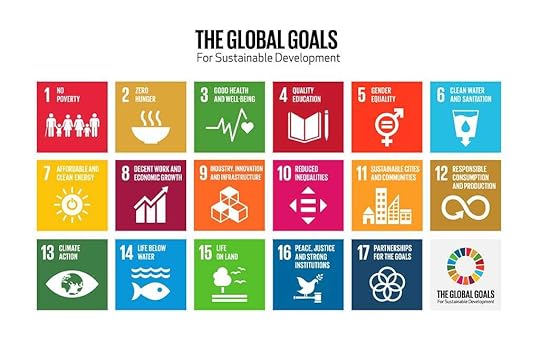
QUT Professor of Intellectual Property and Innovation Matthew Rimmer, one of three editors of the 700-page tome The Elgar companion to intellectual property and the SDGs, said the 33 authors from around the world comprehensively cover the complexities of every aspect of intellectual property (IP) in achieving the SDGs.
The editors acknowledge the problem that “intellectual property is but one policy instrument for achieving welfare gains”.
“[However], it is one premised on rights of exclusion when the SDGs demand greater inclusion and access to global public goods.
“It is against this context that this volume interrogates the role of intellectual property rights as a spur or drag for the realization of the SDGs within and among nations.”

Professor Rimmer, from QUT School of Law, said IP law, policy and practices currently had a “shadowy presence” in the UN 2030 Agenda for Sustainable Development, despite the relevance of the world’s multiple and varied IP systems to each of the 17 SDGs.
“The book contains a variety of proposals to re-align and reform intellectual property law, policy, and practices to better promote the SDGs,” he said.
“Each chapter in the collection has considered whether the various forms of intellectual property help or hinder realisation of the SDG.”
Professor Rimmer said the book also contains recommendations for the development and reform of international institutions to promote the diffusion of sustainable technology.
“Of particular note is the creation of the United Nations Development Program Accelerator Lab Network — an initiative designed to fast-track local innovation in respect of sustainability,” he said.
Case studies
Contributors from QUT School of Law have addressed these issues pertaining to selected SDGs:
Both QUT Associate Professor Felicity Deane and QUT Professor Saiful Karim in their chapters consider IP and environmental issues, namely the transfer of sustainability-related technologies to developing countries.
Professor Karim (SDG 14) outlines the legal avenues under international IP law for the transfer of IP rights-protected marine technology, compulsory licensing and no-patentability, and on special provisions for the least developed countries.
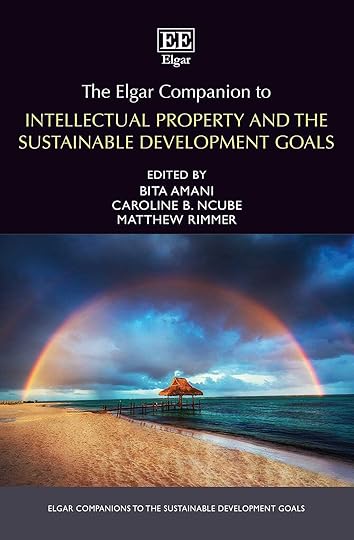
Professor Felicity Deane (SDG 7) highlights the need for innovation and dissemination of new and existing technologies, particularly for renewable energy, to the Global South to reach net zero. While arguing for climate technology IP to be a public good, the chapter considers challenges to individual countries’ domestic IP arrangements and international trade frameworks to illustrate the complexities inherent in technology transfer.
QUT Dr Muhammad Zaheer Abbas’ chapter analyses Covid 19 pandemic impacts on each of the 17 SDGS to demonstrate how IP laws posed a clash between public need and private profit by focussing on three areas: education (SDG 4), right to repair medical devices and access to Covid vaccines, therapeutics and diagnostics (SDG 3).
Dr Abbas said online teaching materials and digital collections for research activities came up against copyright laws, which saw the closure of the National Emergency Library program, soon after it was set-up to maintain access to digitised research material in response to the pandemic lockdowns.
The right to repair medical devices, badly needed to maintain ventilators, was hamstrung by IP laws which gave manufacturers exclusive rights to repair and to refuse information and software for repair processes.
Dr Abbas said that while many political, civil and academic leaders argued for vaccines to be considered ‘global public goods’, extended negotiations over IP rights by the EU, World Trade Organisation and others over developing countries’ access to vaccines, therapeutics and diagnostics demonstrated that “the corporate interests of the biopharmaceutical industry prevailed over public interest in times of unprecedented crisis”.
The chapter illustrates that the pandemic brought sharp focus on the urgent need for consideration of flexible and inclusive intellectual property laws to not only protect the public in times of pandemic but to achieve the SDGs which the climate crisis has initiated.
The Elgar Companion to Intellectual Property and the Sustainable Development Goals is published by Edward Elgar Publishing and is edited by Bita Amani, Caroline B Ncube and Matthew Rimmer.
QUT Media contact:
Niki Widdowson, 07 3138 2999, n.widdowson@qut.edu.au
After hours: 0407 585 901, media@qut.edu.au
Niki Widdowson, ‘Sustainable Innovation: Intellectual Property, Technology Transfer, and Global Public Goods’, QUT News, 22 February 2024, https://www.qut.edu.au/news?id=193013
[image error]December 4, 2023
Tobacco bill before the Australian Senate — “a symphony of law reform”
QUT Media

29th November 2023
QUT researcher Professor Matthew Rimmer, who contributed to the Senate report on the new tobacco regulation bill, has praised the legislation as laying the foundation for law reform on regulation of tobacco and e-cigarettes.
Professor Matthew Rimmer, from the QUT Australian Centre for Health Law Research and a long-time campaigner for tobacco regulation, welcomed the Public Health (Tobacco and other Products) Bill 2023 currently being debated in the Senate.
“The Albanese Government should be congratulated on its leadership, initiative and vision on the promotion of public health,” Professor Rimmer said.
“This legislation is a symphony of law reform. It consolidates disparate pieces of law, and brings them together in a modern, coherent form.
“The bill enhances past pioneering reforms — such as plain packaging of tobacco products. It lays the foundation for future law reform in respect of a tobacco endgame and the regulation of e-cigarettes.
“The legislation should be passed through the Senate without further delay.”

While enthusiastically supporting the bill, Professor Rimmer wrote in his submission that the Public Health (Tobacco and other Products) Bill 2023 should have a separate chapter dealing with the threat of tobacco interference in public health policy through donations to political parties or individuals.
“We have persistent concerns about the tobacco industry and related entities donating to political parties and individual politicians to influence political decision-making,” Professor Rimmer said.
“Senator David Pocock’s additional comments in the report noted allowing the tobacco industry to make political donations did not align with the WHO Framework Convention on Tobacco Control.
“Senator Pocock said ‘the influence of Big Tobacco in Parliament … should not be tolerated. This is counter to our international obligations under the WHO FCTC, is out of step with community expectations and is firmly outside the public interest’.
“He called for transparency around all passes to Parliament House held by corporation lobbyists including those of the tobacco industry.”
Professor Rimmer’s submission was cited throughout the Senate report.
The submission commented on many aspects of the bill including: the need to expand the bill to protect present and future generations from the devastating harms tobacco causes; comprehensive ban on advertising, promotion, and sponsorship of tobacco, e-cigarettes, and related products; the extension of plain packaging regime to e-cigarettes, vaping and other emerging products; greater transparency in tobacco industry operations; addressing civil and criminal liability.
Professor Rimmer said he expected the bill would be passed before the end of the year.
(Main image: Kristaps Solim on Upsplash)
QUT Media contact:
Niki Widdowson, 07 3138 2999 or n.widdowson@qut.edu.au
After hours: 0407 585 901 or media@qut.edu.au.
[image error]October 15, 2023
Shane Rattenbury, the Productivity Commission, and the Right to Repair: Intellectual Property…
Berkeley Technology Law Journal
Matthew Rimmer
 ACT Attorney-General Shane Rattenbury MLA
ACT Attorney-General Shane Rattenbury MLAAbstract
This Article tells the story of the fight for the right to repair in Australia. It is intended to complement comparative research elsewhere, looking at the right to repair in the United States and Canada; the United Kingdom, Switzerland, and the European Union; and other jurisdictions, such as South Africa. Part II of this paper considers the politics of the right to repair in Australia. It explains how Australian Capital Territory (ACT) Attorney-General Shane Rattenbury has sparked a larger law reform inquiry by the Productivity Commission into the right to repair. It highlights how Australia is particularly promising in terms of law reform — due to an unusual consensus amongst the major political parties across the usual divides. Part III focuses on the debate over intellectual property and the right to repair in Australia, and the recommendations of the Productivity Commission. It argues that there needs to be more than just copyright law reform; there should be matching reforms in designs law, trade mark law, patent law, trade secrets, and data protection. Part IV considers the recommendations of the Productivity Commission regarding consumer law and competition policy. It highlights the need for further law enforcement action to protect the right to repair. Part V explores the discussion about the right to repair in the context of sustainable development–looking at submissions on e-waste, the circular economy, and sustainable development. It contends that there should be greater law reform in these areas (going well beyond the limited recommendations of the Productivity Commission in this area). Part VI concludes by noting that the Productivity Commission has asked for action in particular markets in respect of automobiles, agricultural machinery, and tablets. The Article calls for the Australian Parliament to go further and recognise a more broadly based right to repair. Such a recognition will require a holistic approach, involving reforms to intellectual property laws, consumer rights and competition policy, and regulation of the environment and sustainable development. It maintains that it is necessary that the jurisdiction of Australia keep pace on the right to repair with its comparative partners.
Keywords
intellectual property,consumer law,competition policy,e-waste,product design,planned obsolescence,the right to repair,productivity commission,Australian politicsReference
Matthew Rimmer. ‘Shane Rattenbury, the Productivity Commission, and the Right to Repair: Intellectual Property, Consumer Rights, and Sustainable Development in Australia’ (2023) 37 (3) Berkeley Technology Law Journal 989–1056, https://btlj.org/wp-content/uploads/2023/06/0002-37-3-Rimmer.pdf QUT ePrints: https://eprints.qut.edu.au/240739/, SSRN: https://papers.ssrn.com/sol3/papers.cfm?abstract_id=4213963 BePress Selected Works: https://works.bepress.com/matthew_rimmer/401/ OSF: https://osf.io/z3stp/
[image error]The Medical Right to Repair: Intellectual Property, the Maker Movement, and COVID-19
Faculty of Business and Law, Queensland University of Technology (QUT), Brisbane, QLD 4000, Australia
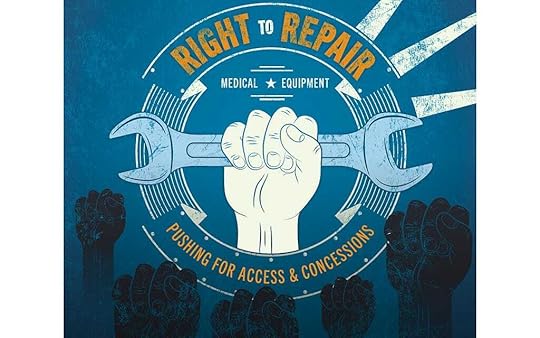
Sustainability 2023, 15(20), 14839; https://doi.org/10.3390/su152014839
Received: 31 July 2023 / Revised: 6 September 2023 / Accepted: 13 September 2023 / Published: 13 October 2023
(This article belongs to the Special Issue Sustainable Logistics and Supply Chain Management in the Post-COVID-19 Era: Future Challenges and Challenging Futures)
AbstractThis article considers the strengths and limitations of the use of 3D printing and additive manufacturing for the production of personal protective equipment (PPE) during the COVID-19 public health crisis. It explores the role of the Maker Movement in addressing the shortfall in medical equipment during the public health pandemic. Taking a comparative approach, this article evaluates the responses of both the commercial and amateur sides of the 3D printing community to the COVID-19 public health crisis. In the EU, the Fab Lab Network sought to overcome a breakdown in supply chains. In the US, Dale Dougherty of Make Magazine promoted Plan C, in which volunteers have worked together to produce PPE. In Australia, 3D printing has been used to augment supplies of PPE. In this context, a key issue across jurisdictions has been the tension between intellectual property rights and the right to repair — particularly when 3D printing has been applied to deal with shortages in PPE. Senator Ron Wyden put forward the Critical Medical Infrastructure Right-to-Repair Act of 2020 (US) to try to resolve these tensions. Open licensing has proven to be a helpful mechanism to enable open collaboration and sharing of 3D printing designs for the purposes of health care. Nonetheless, it is argued that there should be stronger recognition of the right to repair — particularly in the context of health-care and medical devices. The COVID-19 crisis has highlighted that there needs to be a broader array of intellectual property flexibilities to deal with public health emergencies — including in respect of the right to repair. As such, this article supports a broad vision of a TRIPS Waiver which includes the right to repair. The recognition of a right to repair will help promote the realization of the Sustainable Development Goals and a COVID-19 recovery. The topic of the medical right to repair has larger implications for sustainability and the Sustainable Development Goals (SDGs), particularly in respect of responsible production and consumption (SDG 12), as well as good health and well-being (SDG 3), innovation (SDG 9), and partnerships for the goals (SDG 17).
Keywords:
intellectual property; 3D printing; the Maker Movement; the right to repair; COVID-19; sustainability; sustainable development goals; pandemics
Reference:
Matthew Rimmer, ‘The Medical Right to Repair: Intellectual Property, the Maker Movement, and COVID-19’ (2023) 15 (20) Sustainability article no. 14839, https://doi.org/10.3390/su152014839
[image error]July 18, 2023
Misleading Environmental Marketing Messages need Regulation — A Submission to the Australian Senate…
QUT Media, 19 July 2023

Australia needs a new, independent regulatory body and specific offences, penalties and remedies to curb deceptive ‘greenwashing’ marketing claims after the ACCC found the practice was rife among Australian companies.
Vague and unqualified claims about environmental sustainability by Australian companies common: ACCCAustralia should copy EU’s Green Claims Directive to regulate greenwashingAttempts at self-regulation not sufficient to protect consumersQUT law Professor Matthew Rimmer made the call in a submission to the Senate Standing Committee on Environment and Communications Inquiry into “greenwashing … and legislative options to protect consumers”.
Professor Rimmer said Australia’s current regime for regulating greenwashing was fragmented and fractured.
“It is split across consumer law, competition policy, corporations law, advertising standards, and intellectual property,” he said.
“Australia needs a regulatory body, with specialist knowledge, to address misleading and deceptive environmental claims. There should be proper enforcement against the scourge of greenwashing in Australia.”
Professor Rimmer said Australia should emulate the European Union, which is establishing a Green Claims Directive to address concerns about greenwashing in the marketplace.
The Australian Competition and Consumer Commission
Professor Rimmer said the interest of the ACCC (Australian Competition and Consumer Commission) in the topic of greenwashing had waxed and waned — depending upon government priorities.

“The ACCC has shown a renewed interest in the topic and has been the most vigilant greenwashing regulator in Australia,” he said.
“For example, the ACCC fined Volkswagen $125 million under Australian Consumer Law after the company concealed software in vehicles to cheat emissions testing and mislead consumers about compliance with regulations on emission levels.
“The ACCC was responsible for a court enforceable undertaking by LG over a breach of the Trade Practices Act by misrepresenting the comparative energy consumption of refrigerator models.”
Professor Rimmer said ACCC had held an ‘internet sweep’ in October 2022 and found widespread problems with dubious environmental and sustainability claims.
“They looked at 247 business in eight sectors including energy, vehicles, food, cleaning products, clothing and takeaway packaging,” he said.
“The internet sweep uncovered vague and unqualified claims, a lack of substantiating information, the use of false comparisons, exaggerated benefits, or omission of relevant information.
“They were concerned about the accuracy of absolute claims such as ‘100 per cent plastic-free’ or ‘100 per cent recyclable’ and questioned aspirational claims such as ‘zero emissions by 2030’.
“Another questionable ploy was the misuse of third-party certification or the addition of trust marks when there was no third-party endorsement.”
Professor Rimmer said ACCC chair Gina Cass-Gottlieb had told a parliamentary hearing that many consumers based their buying decisions on products’ sustainability credentials.
“She said that environmental claims needed to be underpinned by ‘scientific and rigorous processes’ and that false claims about, for example, achieving net zero carbon emissions would be ‘an unfair competitive situation’.”
Professor Rimmer said, given the ACCC’s finding about the extent of greenwashing and the AANA’s inability to regulate it, Australian Consumer Law should include specific offences and penalties for false and deceptive green marketing.
Ad Standards
In the submission, Professor Rimmer said the model of self-regulation for environmental claims administered by the Australian Association of National Advertisers’ (AANA) had been a failure.
“As the consumer watchdog CHOICE warned back in 2009, ‘the Environmental Claims Code has seen very few green claims investigated satisfactorily’,” he said.
“AANA’s Ad Standards Community Panel has dismissed a score of complaints about greenwashing on questionable grounds.
“The most recent dismissal of a complaint was from the Environmental Defenders about Shell Australia’s claim it planned to be a net zero business by 2050.
“The complaint pointed out that Shell, already one of the country’s biggest polluters, was exploring new oil and gas fields across Australia.
“Furthermore, the Environmental Defenders’ complaint showed that the $500,000 Facebook video spruiking this net zero target did not align with internal Shell emails shown to a US Government committee which stated net-zero was ‘not a Shell business plan’.
“The Community Panel’s reason for dismissal included that Shell’s ad was not misleading nor deceptive and that the ‘advertisement provided sufficient detail to support the Claims as they relate to the organisation in a manner which can be understood by the consumer’.”
Professor Rimmer recommended Australia adopt the UN’s Net Zero Expert Group principles and develop clear standards for net-zero emissions pledges by business, investors, cities and region.
Professor Rimmer’s submission is no 90 here.
QUT Media contacts:
Niki Widdowson, 07 3138 2999 or n.widdowson@qut.edu.au
After hours: 0407 585 901 or media@qut.edu.au.
[image error]May 28, 2023
E-cigarette companies face rising regulation
QUT Media
29 May 2023
E-cigarette Companies Seek IP Protections in Face of Rising Regulation

A sharp rise in intellectual property applications regarding e-cigarettes indicates high investment and speculation in new technology related to them, says QUT Professor of Intellectual Property and Innovation Matthew Rimmer.
Queensland inquiry into Vaping and Reducing Rates of E-Cigarette useSubmission to inquiry looks at other countries’ response to rising use of e-cigarettes and vape productsThe US well ahead in litigation of e-cigarette companies with massive settlements in many statesBritain and New Zealand considering stronger regulationIn a submission to the Queensland Government’s inquiry on Vaping and Reducing Rates of e-cigarette Use in Queensland, Professor Rimmer addressed the inquiry’s request for comment on “jurisdiction analysis of other e-cigarette use inquiries, legislative frameworks, policies and preventative activities”.
“Big Tobacco and e-cigarette companies are seeking to develop patents, trademarks and other forms of intellectual property in this field,” Professor Rimmer, from the QUT Australian Health Law Research Centre, said.
“Some jurisdictions such as India have been reluctant to grant intellectual property rights in this area because of concerns that e-cigarettes lack utility and social benefits.”
Professor Rimmer’s submission supports the Australian Government’s proposals for new regulations including: border controls on non-prescription vapes; minimum quality standards for vapes; restrictions on flavours, colours, and other ingredients; pharmaceutical-like plain packaging; reduction of nicotine concentrations and volumes; and a ban on all single use, disposable vapes, with heightened enforcement.
“Vapes containing nicotine are illegal in Queensland, unless on prescription, and is being enforced — recently a convenience store was ordered to pay $35,000 plus court costs for possessing and selling nicotine-containing vapes.”
Professor Rimmer said Australian policymakers should note the massive litigation in the United States’ courts against e-cigarette company Juul by the states, school districts, Indigenous communities, and others that have resulted in billions of dollars in settlements.
“US litigation has extensively documented the adverse impacts of e-cigarettes upon consumer rights, public health, education, children’s rights, and Indigenous rights,” he said.
“Australian policymakers ought to take note of further legislative moves by the Biden Administration and the US Congress and the US Food and Drug Administration and the Federal Trade Commission.
“Juul has been found in numerous US jurisdictions to have deliberately designed the product, its flavours, and chemical composition to appeal to young people with no regard for public health.
“According to Reuters, Juul has settled with 45 states for more than $1B and is facing lawsuits and investigations in Minnesota, Florida, Michigan, Maine and Alaska.
“Apart from state-brought litigation, Reuters reported Juul had agreed to pay $1.7B to local governments and individual consumers.
“In addition, school districts, First Nations, and federal authorities the FDA and Federal Trade Commission have ongoing involvement in curbing or stopping e-cigarette use on grounds of deceptive marketing to minors and tobacco companies’ monopolistic practices.”

Professor Rimmer said Britain and New Zealand had not had such a litigious approach to regulation of e-cigarettes and vapes.
“This could be partly due to the hope in each country that e-cigarettes could help people to cease smoking tobacco,” he said.
“In the UK, the Local Government Association, chief medical officer and Action on Smoking and Health (ASH) have called for higher taxes and tighter regulation of marketing of vape products, but it is the Advertising Standards Authority which has brought several actions against e-cigarette companies.”
Professor Rimmer said New Zealand had a prohibition against e-cigarettes and vape sales to minors and on free, discounted or bundled distribution and supply as well as flavours and colourings restrictions.
Both countries are concerned also about the environmental effects in the making and disposal of e-cigarettes and vape products.
Professor Rimmer said the World Health Organization was ‘underwhelmed’ about the efficacy of e-cigarettes in tobacco cessation.
“WHO has warned about e-cigarette and tobacco companies making false and misleading health and therapeutic claims about their products and about their environmental impacts ‘from the mining of materials for batteries to metal and plastic waste leaching into soil and water’.
“The WHO supports bans or, at the very least, tight regulations on electronic nicotine delivery systems.”
Rimmer, Matthew (2023) A Submission on Vaping and Reducing Rates of E-Cigarette Use in Queensland. Health and Environment Committee, the Queensland Parliament. https://eprints.qut.edu.au/239457/
Health and Environment Committee, Vaping — An Inquiry into Reducing Rates of E-Cigarette Use in Queensland, Queensland Parliament, 2023 https://www.parliament.qld.gov.au/Work-of-Committees/Committees/Committee-Details?cid=169&id=4242
Press Release
Niki Widdowson, ‘E-cigarette Companies Seek IP Protections in Face of Rising Regulation’, QUT Media, 29 May 2023, https://www.qut.edu.au/news?id=187394 See also Queensland Government Press Release on Vaping Inquiry, https://statements.qld.gov.au/statements/97806
[image error]Matthew Rimmer's Blog
- Matthew Rimmer's profile
- 4 followers



